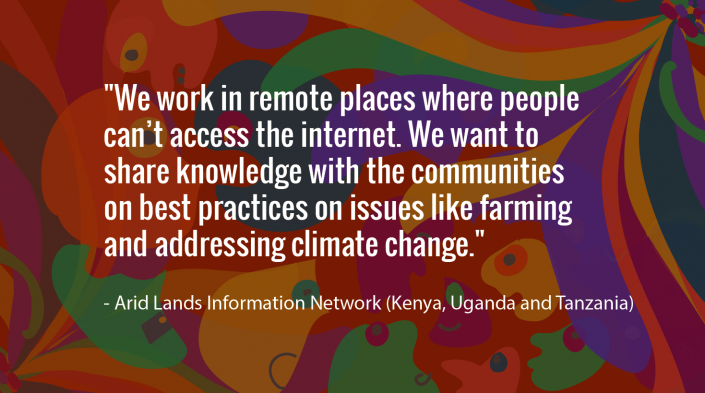
Published on
Page last updated on
How are APC members improving their communities' lives? In this column we’re highlighting stories of impact and change by our members, supported by APC subgranting. Arid Lands Information Network promotes information and knowledge exchange in rural communities so that they can achieve food security in East Africa.
Supporting communities so that they achieve food security is the goal of Arid Lands Information Network (ALIN), an organisation that joined the APC network in 2003. ALIN works on providing practical and usable information on sustainable agriculture and the environment through information and communications technologies (ICTs) in rural areas in Kenya, Uganda and Tanzania.
As an organisation that has been promoting some of the key principles of the African Declaration on Internet Rights and Freedoms, ALIN has also become a relevant voice in the defence of access for underserved communities, participating in local and regional events and forums to share and exchange their experiences in promoting internet access, such as the Forum on Internet Freedom in Africa (FIFAfrica). They have shared their insights on FIFAfrica 2017 and FIFAfrica 2018, highlighting challenges and successes in their work on internet freedom and human rights.
Information exchange in arid lands communities
“To a high degree in this day and age, access to knowledge can be equated to access to ICTs,” ALIN highlighted in conversation with APC. “However, access can only be achieved if there are joint efforts between the public and private sector to tap into this potential by developing skills and infrastructure to support voice and data access in rural areas.”
With this goal in mind, ALIN started its activities in information exchange with arid lands communities in Eastern Africa in 1988 with the first issue of Baobab magazine. The name Baobab was inspired by the tree’s resilience and universal presence in the arid lands of Africa. The magazine has since featured practical and usable information on development practices with a focus on agriculture and environmental matters. Since then, approximately 60 issues have reached an estimated 2.5 million development workers in Africa.
By 1999, ALIN realised the need to integrate technology in its knowledge management activities and partnered with World Space Corporation in the use of satellite radio receivers to deliver both voice and data access in areas with no internet connectivity. ALIN successfully piloted the Open Knowledge Network (OKN), a system linking grassroots information and knowledge-sharing initiatives to promote the creation and exchange of local content supported by ICTs.
To ensure that the communities are able to use these tools to meet specific needs such as livelihoods, civic engagement or education, ALIN started communities of practice known as Maarifa Centres (“Knowledge Centres”), public spaces that offer digital tools such as computers, internet connectivity and library services. Through these centres, the organisation facilitates digital inclusion for the most vulnerable communities and mobilises collective action on development areas such as environmental justice and sustainability through creation and sharing of knowledge.
In 2017, the team deployed a Community Education, Business and Information Centre in Samburu County, Kenya. The centre focuses on promoting access to information and creating business opportunities for vulnerable communities. The Samburu County government, a partner in the project, also uses the centre for its development activities.
A digital library to redress “weak communities of practice”
With support from an APC subgrant, in 2018 ALIN built a digital library to collect, manage, index and distribute digital items to communities around the Ng’arua Maarifa Centre in Laikipia County in Kenya. The library was an attempt to redress what ALIN calls “weak communities of practice” in rural areas, as a result of a lack of access to reliable information. It includes videos and multimedia information on agriculture, climate change and Indigenous technical knowledge.
“This is a remote place and people here can’t access the internet. We wanted to share knowledge of best practices on key issues like farming and also to educate the community about climate change,” ALIN’s Bob Aston stressed. "We hoped that these best practices would be further shared in the area, and adopted by others over time.”
“It gave us experience in what’s possible,” Aston added, emphasising that this work paved the way for other initiatives, including a project to strengthen access to information with the Meru County government, also in Kenya. “We lacked funds to implement the Ng’arua project, so this would not have been possible if we had not received the grant.”
Remote working during the COVID-19 pandemic in Kenya
The work of ALIN, like many others, was affected by the outbreak of the COVID-19 pandemic. With support from APC, the organisation decided to conduct research between June and August 2020 on “Remote Working During the COVID-19 Pandemic in Kenya” to support the fight against the pandemic by development actors, linking them to shared online resources and knowledge.
The research looked at ICT tools that are most commonly in use. How these tools are used, how big of a threat COVID-19 is to organisations and which communication technologies are the most useful to support communities during the pandemic were some of the issues addressed. Evidence showed that the biggest use of ICTs in the communities is for remote work, followed by sharing information and personal communications. It also revealed that the biggest challenge to using technology effectively during the pandemic is affordability of ICT devices, as well as availability and accessibility of devices.
This piece is a version of a story highlighted in Continuing the conversation: Lessons from APC subgranting, a report that presents the findings of interviews and surveys of APC members and partners who were recipients of funding through its core subgranting programme, supported by Sida, and of subgrants offered through other APC projects and staff working on subgranting in the organisation.
Did this story inspire you to plant seeds of change in your community? Share your story with us a at communications@apc.org


